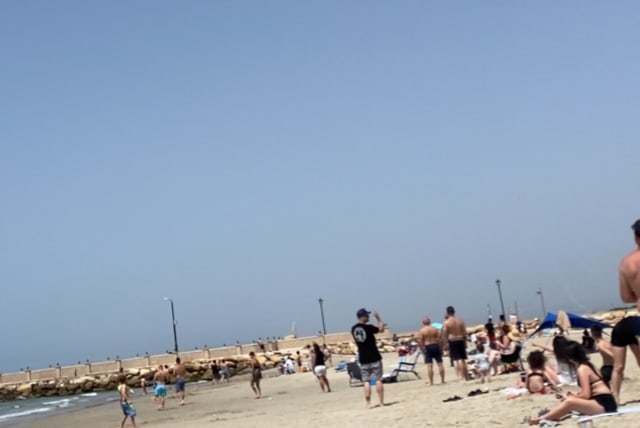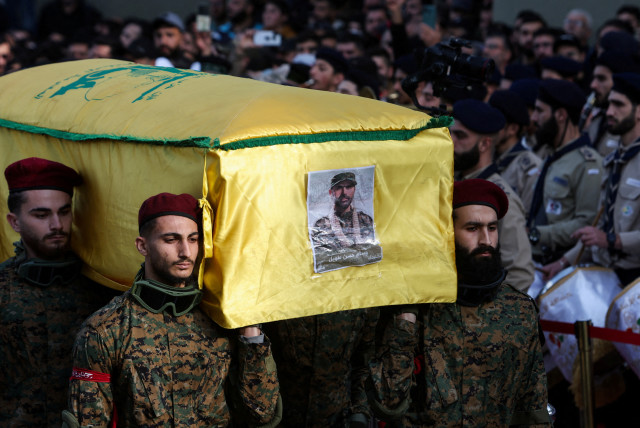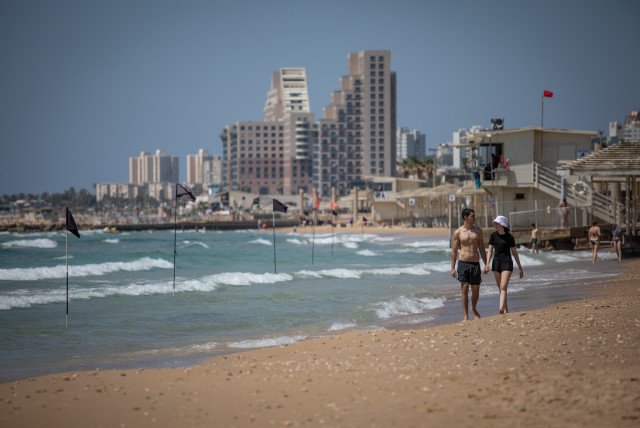Under Hezbollah fire on the bay of Haifa

On Tuesday, Hezbollah launched the deepest attack on Israel since the start of the war. One JPost reporter shares his experience of a beach under fire.
I went to the beach north of Haifa on Passover, expecting a nice day with the family near the sea. The water is warming up as spring waits for summer to come. The bay of Haifa is a pretty windswept beach that borders Kiryat Yam and stretches from Haifa to Acre.
The large maritime port of Haifa is visible, with its cranes and loading docks and piers where container ships can disgorge cargo. Many of those ships are anchored off the coast.
Last Passover, in 2023, terrorists in Lebanon launched a barrage of rockets at the northern border of Shlomi. Therefore, I expected escalation this Passover because Israel is in a six month war in Gaza and Hezbollah in Lebanon feels impunity to rain down rockets on northern Israel.
Over 3,200 rockets, drones and missiles have been fired by Hezbollah.
However, the bay of Haifa and the cities near it, such as Acre and Haifa, have not usually been targeted by Hezbollah. This is because of the unofficial “rules” of the current war in the north. Despite daily Hezbollah attacks to which the IDF respond, neither side usually strikes deep into the other state.
This means Hezbollah targets northern Israeli communities that have mostly been evacuated, but doesn’t target the city of Nahariya, which has not been evacuated. The Krayot, the numerous suburbs north of Haifa, have also not been targeted.
That changed on April 23, 2024
I was at the beach along with hundreds of people. Some were kite-surfing. Others were fishing. Mostly people were just wading in the water. There is a lifeguard station at the far northern part of the beach of Kiryat Yam.
It is called the ‘Virgin’ beach for some reason, and there is a small shop and new sandwich place called the “Betula” or “virgin” sandwich. Acre is visible in the distance, several miles up the bay.
The morning was full of signs of possible escalation. There were the sound of warplanes in the air. Hezbollah said overnight that Mohammad Khalil Atiyeh, a member of its Radwan force, was killed.
The IDF said that in the morning “IAF aircraft struck and eliminated Hussein Ali Azkul, a significant terrorist operative in Hezbollah's Aerial Defense Unit in southern Lebanon. Azkul was heavily involved in the planning and execution of terrorist attacks against Israel and was involved in the Hezbollah's Aerial unit's routine activities.
His elimination significantly harms the capabilities of Hezbollah's Aerial Unit.”
I thought that this would likely mean there might be escalation.
I heard the sound of booms around 13:08 and the IDF said that “Following the sirens that sounded in northern Israel regarding a hostile aircraft infiltration, a short while ago, the IDF Aerial Defense Array successfully intercepted a suspicious aerial target off the coast of Nahariyya.”
Around thirty minutes, an air defense interceptor became visible in the distance, over the water, with the city of Acre framing the scene. Within a few seconds the sirens sounded and people began grabbing their kids from the water and quickly walking inland.
There were no shelters so some people opened a lifeguard station and tried to cram into the bottom room, where the station keeps its longboard to do rescues. It was clear this was not a protected room: it was made of wood.
I stood there now with the dilemma, whether to put my son, who was with me, into the shelter with a bunch of adults who were cramming themselves in, or to just walk to the southern side of the stand and take shelter.
Years of covering the war in Sderot taught me that it's better, in the absence of shelter, to put something between you and where the rockets or interceptions are, and to have something over your head.
So I gave up with trying to cram myself or my young kid between mountains of people, and instead wandered around to the south of the shack and waited. The sirens were over. Whatever had happened, had happened. There weren’t interceptions overhead, so there was no shrapnel coming down. If it was our “time,” it would have happened a minute before we tried to cram into the non-shelter.
Now that the sirens were over I went back to the beach, grasping my hastily gathered glasses case, phone and keys. You need keys to flee a rocket attack. You need glasses and a phone. Back at the beach around ninety percent of the people had now left and the parking lot, that had been bursting with cars, was emptying.
I have a sense of how escalation takes place in the north. It’s a tit-for-tat deadly dance. Hezbollah doesn’t usually target the same place multiple times. Instead it sends messages via its rockets and drones. This was a “message” and part of the deadly “equation” with Israel.
It is the one Israel’s authorities have decided is fine. They don’t want to deter Hezbollah. They want a proportional conflict to go on. In this conflict the people of Lebanon and Israel suffer, but Hezbollah does what it wants and is not deterred and the military strategy of proportional responses leads to the kind of sirens and cramming into non-shelters that I experienced.
It’s not fair to people with families, but this is the method Israel has chosen since October 7. It is a policy of letting people suffer under endless attacks and wars on multiple fronts that have no end in sight and which lack clarity.
The IDF said that “following the sirens that sounded in northern Israel regarding a hostile aircraft infiltration, a short while ago, the IDF Aerial Defense Array successfully intercepted two suspicious aerial targets off the northern coast.
The sirens regarding rocket fire sounded following the possibility of fallen shrapnel from the interception. The incident has concluded.” Therefore the entire cramming experience into the wooden lifeguard post was largely to protect ourselves from falling debris.
In the end I went back to the beach and sat and watched the ocean. The terrorists should not be allowed to win and take away the holidays from the people who have a right to enjoy them.
Jerusalem Post Store
`; document.getElementById("linkPremium").innerHTML = cont; var divWithLink = document.getElementById("premium-link"); if (divWithLink !== null && divWithLink !== 'undefined') { divWithLink.style.border = "solid 1px #cb0f3e"; divWithLink.style.textAlign = "center"; divWithLink.style.marginBottom = "15px"; divWithLink.style.marginTop = "15px"; divWithLink.style.width = "100%"; divWithLink.style.backgroundColor = "#122952"; divWithLink.style.color = "#ffffff"; divWithLink.style.lineHeight = "1.5"; } } (function (v, i) { });


